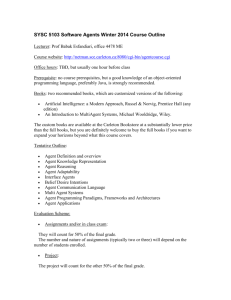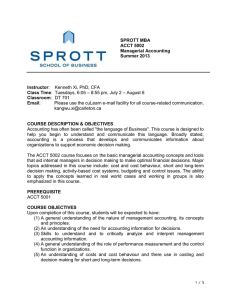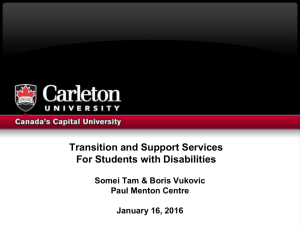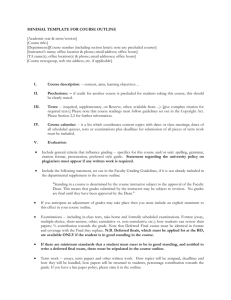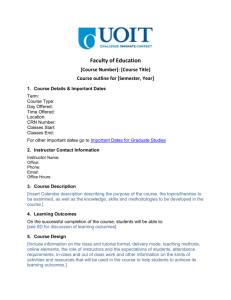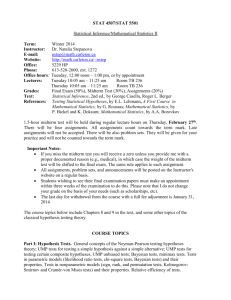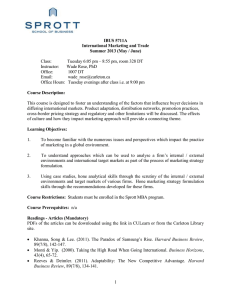FINA 5511 Investments Syllabus - Carleton University
advertisement
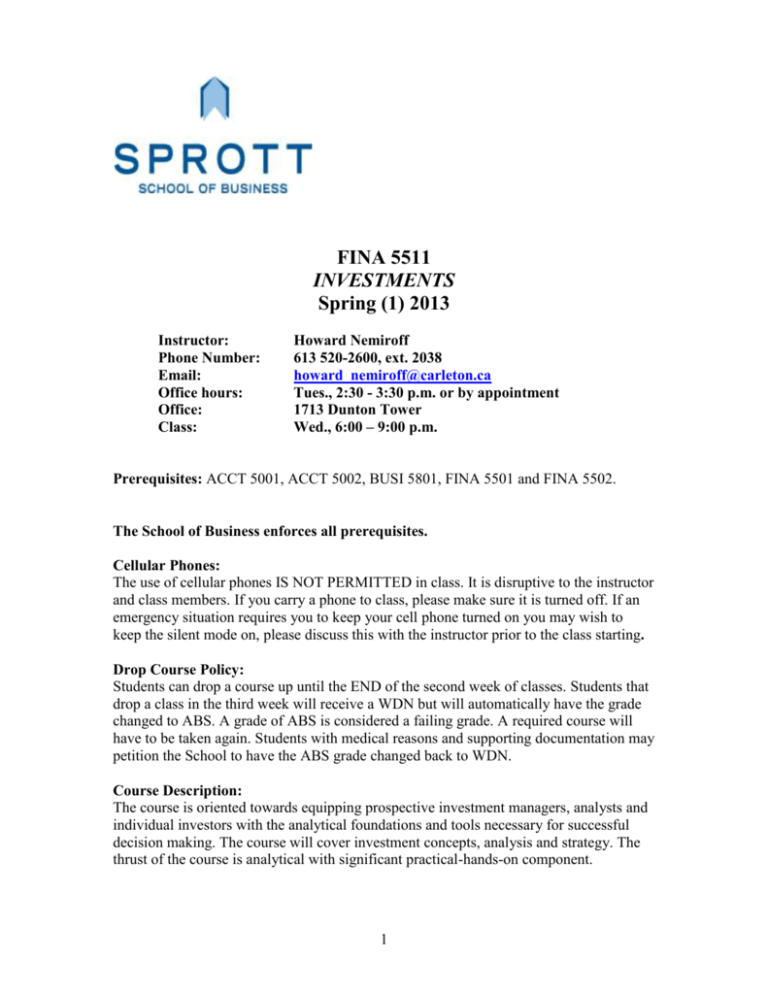
FINA 5511 INVESTMENTS Spring (1) 2013 Instructor: Phone Number: Email: Office hours: Office: Class: Howard Nemiroff 613 520-2600, ext. 2038 howard_nemiroff@carleton.ca Tues., 2:30 - 3:30 p.m. or by appointment 1713 Dunton Tower Wed., 6:00 – 9:00 p.m. Prerequisites: ACCT 5001, ACCT 5002, BUSI 5801, FINA 5501 and FINA 5502. The School of Business enforces all prerequisites. Cellular Phones: The use of cellular phones IS NOT PERMITTED in class. It is disruptive to the instructor and class members. If you carry a phone to class, please make sure it is turned off. If an emergency situation requires you to keep your cell phone turned on you may wish to keep the silent mode on, please discuss this with the instructor prior to the class starting. Drop Course Policy: Students can drop a course up until the END of the second week of classes. Students that drop a class in the third week will receive a WDN but will automatically have the grade changed to ABS. A grade of ABS is considered a failing grade. A required course will have to be taken again. Students with medical reasons and supporting documentation may petition the School to have the ABS grade changed back to WDN. Course Description: The course is oriented towards equipping prospective investment managers, analysts and individual investors with the analytical foundations and tools necessary for successful decision making. The course will cover investment concepts, analysis and strategy. The thrust of the course is analytical with significant practical-hands-on component. 1 Required Text: Bodie et al., Investments, 7th Canadian Edition, McGraw-Hill, Ryerson, 2011. Further Reading: Malkiel, B., A Random Walk Down Wall Street, Norton. Graham, B., The Intelligent Investor, Harper Collins Graham, B. & D. Dodd, Security Analysis, McGraw-Hill Grading: Project, Due June 12, 6:00 p.m. In-class Quizzes, weeks 2-5 (4 in total, keep best 3) Final Examination Wed., June 19h, 6 - 9p.m. Total 35% 15% 50% 100% Deferred Final Examination: Students unable to write a final examination because of illness or other circumstances beyond their control must contact the instructor and the MBA office in writing to request a deferred exam. Permission may be granted when the absence is supported by a medical certificate and or appropriate document/s to support the reason for the deferral. Deferred exams are not granted for students who have made travel arrangements that conflict with examination schedule. Quizzes will commence at 6 p.m. on the scheduled class date. There will be no make-ups for missed quizzes. The project must be formally submitted in hard copy no later than June 12, at 6 p.m. Neither e-mailed nor late submissions will not be graded. NOTE: Problem sets will be placed on CULearn on a regular basis. It is expected that all students complete the sets, and to follow daily business news through newsprint sources such as Barron’s, The Economist, Report on Business, Financial Post, Wall Street Journal, Financial Times, etc., in order to be adequately prepared for class. 2 Course Outline Topic Introduction Markets and Instruments Money Market Fixed Income Equities Derivatives How Securities Are Traded Issuing Securities Trading and Market Orders Regulations Choice Under Uncertainty Utility Theory, Risk Aversion, and Portfolio Mathematics Hedging and Insurance Probability Theory Risky Portfolios and the Risk-Free Asset Efficient Allocation CAPM Index Models Market Efficiency Bonds (time permitting) Prices and Yields Term Structure Duration/convexity Derivative Assets (time permitting) Options Valuation Futures Swaps Chapter 1 2 3 4-8 9 12 - 14 17-19 Project Students will form groups of not more than 3 students each (you cannot do it alone). Choosing a firm from either the SP/TSX60 or S&P500, each group will be asked to submit a full fundamental and technical analyst’s report on the chosen firm (buy-side analysis). The fundamental analysis should make full use of the models available in the text and presented in class (CAPM, APT, Dividend Growth, Implied Volatility, etc.), and the technical analysis should incorporate some of the currently employed signals (Charting etc.). Please read chapters 15 and 16 of the text for background material (as well as Graham, and Graham & Dodd). You may also wish to visit certain websites such as; www.marketwatch.com, www.bloomberg.com, as starting points for detailed research, or http://www.biz.uiowa.edu/henry/index.html for an example of what MBA Finance students are doing at the University of Iowa. Further, you have access to the Bloomberg terminal in the library, and Capital IQ here in Dunton for firm specific information. The ultimate purpose of the report is to determine whether the share price of 3 the chosen security is appropriate. Consider me to be your portfolio manager, you are my analyst, and tell me what to do. Some of the questions you may wish to consider: What do you expect for the economy, industry and firm? Where is the firm positioned within the industry? How exposed is it to global/political/economic risks? Is it a strong buy? Accumulate? Hold? Sell? What do the models and charts tell you, and ultimately what do you tell me, the manager? Does this belong in our portfolio, and should we get our clients to buy in? What are other investment analysts suggesting? The text of the report must be in hard copy form, e-submissions will not be accepted, and cannot be more than 1500 words (approximately 5 pages of text). Appendices including data analysis and graphs are acceptable, and count toward the 5 page limit. I do not need to see the data used, just source it so that I can verify your numbers if it looks off. Ensure that all references are included, and provide the url if a webpage is used. IMPORTANT ADDITIONAL INFORMATION Group Work The Sprott School of Business encourages group assignments in the school for several reasons. They provide you with opportunities to develop and enhance interpersonal, communication, leadership, follower-ship and other group skills.Group assignments are also good for learning integrative skills for putting together a complex task. Your professor may assign one or more group tasks/assignments/projects in this course. If you have a group assignment you may find the resources at http://sprott.carleton.ca/academic_programs/groupwork useful. Before embarking on a specific problem as a group, it is your responsibility to ensure that the problem is meant to be a group assignment and not an individual one. Medical Certificate Please note that in all occasions that call for a medical certificate you must use or furnish the information demanded in the standard university form. http://www.carleton.ca/registrar/forms/Med_Cert_Carleton_University.pdf Academic Accommodations for Students with Disabilities The Paul Menton Centre for Students with Disabilities (PMC) provides services to students with Learning Disabilities (LD), psychiatric/mental health disabilities, Attention Deficit Hyperactivity Disorder (ADHD), Autism Spectrum Disorders (ASD), chronic medical conditions, and impairments in mobility, hearing, and vision. If you have a disability requiring academic accommodations in this course, please contact PMC at 613520-6608 or pmc@carleton.ca for a formal evaluation. If you are already registered with the PMC, contact your PMC coordinator to send me your Letter of Accommodation at the beginning of the term, and no later than two weeks before the first in-class scheduled test or exam requiring accommodation (if applicable). After requesting accommodation from PMC, meet with me to ensure accommodation arrangements are made. Please 4 consult the PMC website for the deadline to request accommodations for the formallyscheduled exam (if applicable). Religious Observance Students requesting academic accommodation on the basis of religious observance should make a formal, written request to their instructors for alternate dates and/or means of satisfying academic requirements. Such requests should be made during the first two weeks of class, or as soon as possible after the need for accommodation is known to exist, but no later than two weeks before the compulsory academic event. Accommodation is to be worked out directly and on an individual basis between the student and the instructor(s) involved. Instructors will make accommodations in a way that avoids academic disadvantage to the student. Students or instructors who have questions or want to confirm accommodation eligibility of a religious event or practice may refer to the Equity Services website for a list of holy days and Carleton’s Academic Accommodation policies, or may contact an Equity Services Advisor in the Equity Services Department for assistance. Pregnancy Pregnant students requiring academic accommodations are encouraged to contact an Equity Advisor in Equity Services to complete a letter of accommodation. The student must then make an appointment to discuss her needs with the instructor at least two weeks prior to the first academic event in which it is anticipated the accommodation will be required. Plagiarism The University Senate defines plagiarism in the regulations on instructional offenses as: “to use and pass off as one’s own idea or product work of another without expressly giving credit to another.” Borrowing someone else’s answers, unauthorized possession of tests or answers to tests, or possession of material designed in answering exam questions, are also subject to university policy regarding instructional offenses. For more information on Carleton University’s Academic Integrity Policy, consult: http://www.carleton.ca/studentaffairs/academic_integrity The photocopying of substantial portions of a textbook (e.g. more than 1 chapter or 15% of the total page count) without the publisher's permission is another misuse of intellectual property, and is also a violation of Canadian copyright law. Access Canada's web site provides guidelines on legitimate copying. You may also find helpful information at: http://library.wlu.ca/access/guidelines.htm Summer Term 2013 May 6 Early summer and full summer classes begin. May 13 Last day for registration and course changes for early summer courses. 5 May 17 Last day for registration and course changes for full summer courses. May 20 Statutory holiday. University closed. May 31 Last day to withdraw from early summer courses with full fee adjustment. June 7 Last day to withdraw from full summer courses with a full fee adjustment Last day to submit to the Paul Menton Centre for Students with Disabilities, formal Examination Accommodation Forms for June examinations. June 14 MBA early summer classes end June 17-21 MBA early summer exams and final deliverables June 24-28 MBA class break June 30 Final deadline for summer term fee payment. July 1 Statutory holiday. University closed. July 2 Late summer classes begin. Full summer classes resume. July 9 Last day for registration and course changes for late summer courses. July 19 Last day for withdrawal from late summer courses with full fee adjustment. July 26 Last day to submit to the Paul Menton Centre for Students with Disabilities, Formal Examination Accommodation Forms for August examinations. August 5 Statutory Holiday. University closed. August 14 Last day of late summer and full summer classes. 6 Last day for academic withdrawal from late summer and full summer courses and any other courses that end this term. Last day for handing in term assignments, subject to any earlier course deadline. August 16 Summer Co-op Work Term Reports are due. August 17-22 Summer examinations may be held. Examinations are normally held in the day and evening during the Monday to Saturday period. In exceptional circumstances, it may be necessary to schedule an examination on a Sunday. September 27-28 Summer term deferred final examinations will be held. Examinations are normally held in the day and evening. September 30 Last day for receipt of applications for review of final grades for summer term courses. 7
